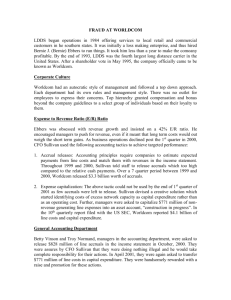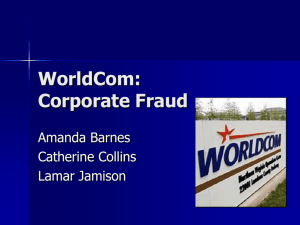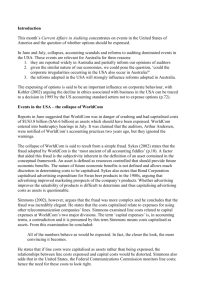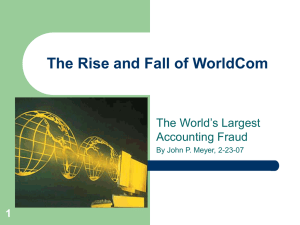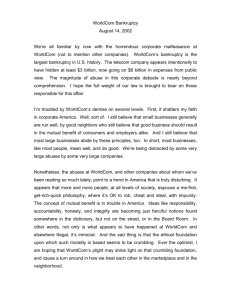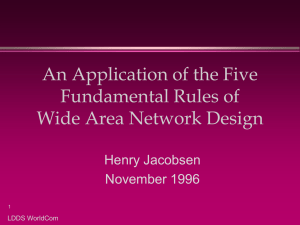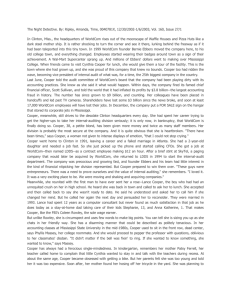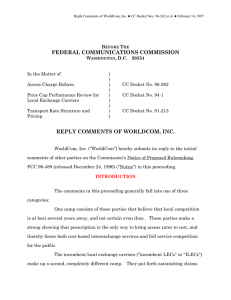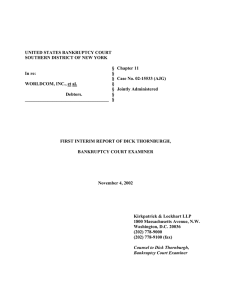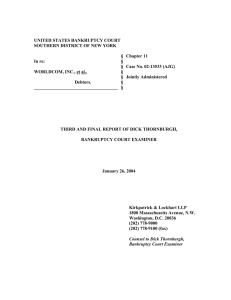Introduction to Organizational Behavior (OB)
advertisement
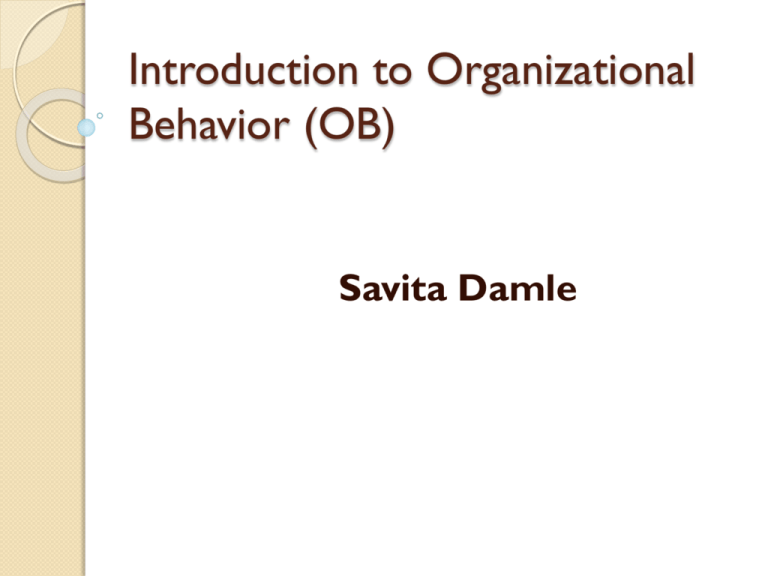
Introduction to Organizational Behavior (OB) Savita Damle How effective are you at what you do? Where do you have an edge over others? What makes you feel bad? What Managers Do Managers get things done through other people. Managers make decisions, allocate resources and direct the activities of others to attain goals. Allocation of Activities by Time Open Systems View of Organization Formal vs. Informal Organization Formal Organization – the official, legitimate, and most visible part of the system Informal Organization – the unofficial and less visible part of the system Hawthorne Studies: studies conducted during the 1920’s and 1930’s that suggested the importance of informal organizations. Formal & Informal Elements of Organizations Social Surface Formal organization (overt) Goals and objectives Policies and procedures Job descriptions Financial resources Authority structure Communication channels Products and services Informal organization (covert) Beliefs and assumptions Perceptions and attitudes Values Feelings, such as fear, joy anger, trust, and hope Group norms Informal leaders Where Managers Work Organization A consciously coordinated social unit, composed of two or more people, that functions on a relatively continuous basis to achieve a common goal or set of goals. Management Functions Planning Organizing Management Functions Controlling Leading Mintzberg’s Managerial Roles Mintzberg’s Managerial Roles (cont’d) Mintzberg’s Managerial Roles (cont’d) Management Skills Technical skills The ability to apply specialized knowledge or expertise. Human skills The ability to work with, understand, and motivate other people, both individually and in groups. Conceptual Skills The mental ability to analyze and diagnose complex situations. Enter Organizational Behavior Organizational behavior (OB) A field of study that investigates the impact that individuals, groups, and structure have on behavior within organizations, for the purpose of applying such knowledge toward improving an organization’s effectiveness. Replacing Intuition with Systematic Study Intuition A feeling not necessarily supported by research. Systematic study Looking at relationships, attempting to attribute causes and effects, and drawing conclusions based on scientific evidence. Evidence Based Management (EBM)- basing management decisions on best available scientific evidence. There Are Few Absolutes in OB Contingency variables Situational factors: variables that moderate the relationship between two or more other variables and improve the correlation. x Contingency Variables y The Dependent Variables Dependent variable A response that is affected by an independent variable. y x Sociology the science of society Psychology the science of human behavior Anthropology the science of the learned behavior of human beings Interdisciplinary Influences on Organizational Behavior Management the study of overseeing activities and supervising people in organizations Engineering the applied science of energy & matter Medicine the applied science of healing or treating diseases to enhance health and well-being WorldCom Whistle – blower Cynthia Cooper What happened /Key Events By 2000 WorldCom was facing a consumer price war, the rise of mobile telephone usage and a vast over- capacity of bandwidth coverage. Consumer demand for the provision of internet services offered over broadband networks was dwindling and the log – distance sector was characterized by falling rates and the rise of local competition. Ghost Profits In June 2002 the WorldCom group admitted to overstating profits by nearly $4 billion through the use of illusory accounting practices. In order to improve the appearance of the company’s financial situation, Scott Sullivan authorized the improper recording of expenses as capital investments. Operating expenses are immediately deducted from revenue, whilst capital investments are subject to depreciation over a number of years. This incorrect spreading of operating costs resulted in the overstatement of WorldCom’s profits. Manipulation of Reserves: Companies often set aside reserves in order to cover foreseeable estimated costs and losses. WorldCom allegedly inflated the value of its reserves so as to create a hefty ‘slush fund’ that could be used to boost profits. The manipulation of reserves resulted in a profit irregularity of roughly $3.3billion. At the time of WorldCom’s disastrous announcement in June 2002, Bernard Ebbers had more than $ 400 million in personal loans outstanding from the company. Subsequent investigation has brought the total losses resulting due to fraudulent behavior by WorldCom executives to $11 billion. The Whistle –blower Cynthia Cooper the then – vice president of internal audit at WorldCom, decided to investigate anomalities in the company’s accounting entries and ended by inspiring critical – and heavily critized – legislation: the US Senate responded to revelations about massive accounting fraud at the telecom giant. She brought it out to the world the anomalies in the Companies Accounting. Consequences Shortly after WorldCom’s announcement the SEC filed a civil lawsuit against the company, charging it with fraud. In July 2002 WorldCom filed for bankruptcy. The company was forced to sell off most of its peripheral business units and cut 17,000 jobs. In 2003 WorldCom was forced to pay a $ 500 million penalty to the SEC. Consequences for Cynthia Despite being lauded moths later in Time magazine, Cooper says she never felt like a hero. Just the opposite: In the aftermath of the disclosure of the fraud, with the press and lawyers and congressional investigators constantly on her trail, Cooper was seized by depression and anxiety. She has come to understand that her life will never be the same. These days, Cooper spends most of her time talking to high school students and college students, urging them to be prepared for that moment when an ethical choice presents itself. “People don’t often realize that they’re facing a dilemma, “Cooper says. “There are a lot of pressures that come to bear in the workplace and people should prepare beforehand. In your life/job What were/ are some of the challenges you face? Challenges and Opportunities for OB Responding to Globalization ◦ ◦ ◦ ◦ Increased foreign assignments Working with people from different cultures Coping with anti-capitalism backlash Overseeing movement of jobs to countries with lowcost labor ◦ Managing people during the war of Terror Managing Workforce Diversity ◦ Embracing diversity ◦ Changing U.S. demographics ◦ Implications for managers Recognizing and responding to differences Challenges and Opportunities for OB (cont’d) Improving Quality and Productivity ◦ Quality management (QM) ◦ Process reengineering Responding to the Labor Shortage ◦ Changing work force demographics ◦ Fewer skilled laborers ◦ Early retirements and older workers Improving Customer Service ◦ Increased expectation of service quality ◦ Customer-responsive cultures Challenges and Opportunity for OB (cont’d) Improving People Skills Empowering People Stimulating Innovation and Change Coping with “Temporariness” Working in Networked Organizations Helping Employees Balance Work/Life Conflicts Improving Ethical Behavior
